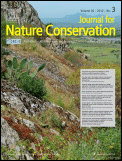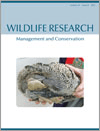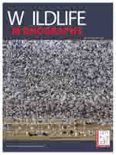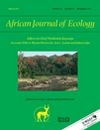
JOURNAL FOR NATURE CONSERVATION
Scope & Guideline
Advancing the Science of Conservation
Introduction
Aims and Scopes
- Biodiversity Conservation:
Research centered on preserving various species and ecosystems, focusing on both threatened and endemic species across different habitats. - Ecological Modeling and Assessment:
Utilization of modeling techniques to predict species distribution, assess habitat quality, and evaluate conservation strategies. - Human-Wildlife Interactions:
Exploration of the dynamics between human activities and wildlife populations, including conflicts and coexistence strategies. - Community Involvement and Engagement:
Studies on the role of local communities in conservation efforts, including citizen science and participatory management approaches. - Impact of Climate Change:
Research examining how climate change affects biodiversity and conservation strategies, with implications for future habitat management. - Restoration Ecology:
Focus on methods for restoring degraded ecosystems, including practical case studies and theoretical frameworks for effective restoration. - Sustainable Resource Management:
Investigations into the sustainable use of natural resources, including fisheries and forestry, and their impact on biodiversity. - Conservation Policy and Governance:
Analysis of policies and governance structures that influence conservation efforts, focusing on their effectiveness and implementation challenges.
Trending and Emerging
- Climate Resilience and Adaptation:
Emerging research focuses on how ecosystems can adapt to climate change impacts, emphasizing resilience strategies and the identification of climate refugia. - Integrated Conservation Approaches:
There is a growing trend towards interdisciplinary research that combines ecological, social, and economic perspectives in conservation planning and management. - Urban Ecology and Biodiversity:
Increasing attention is being paid to conservation efforts within urban environments, highlighting the importance of maintaining biodiversity amidst urbanization. - Ecosystem Services Valuation:
Research is increasingly focusing on the quantification and valuation of ecosystem services, linking biodiversity conservation to human well-being and economic benefits. - Technology in Conservation:
The use of technology, including remote sensing, drones, and eDNA, is on the rise, facilitating more effective monitoring and management of conservation efforts. - Participatory Conservation Strategies:
A notable increase in studies that emphasize participatory approaches, engaging local communities in conservation practices and decision-making processes. - Conservation Financing Mechanisms:
Emerging literature is exploring innovative financial models and mechanisms to support conservation initiatives, including market-based approaches and public-private partnerships.
Declining or Waning
- Invasive Species Management:
Research on invasive species has decreased, possibly due to a shift in focus towards broader ecosystem management strategies that incorporate native species conservation. - Traditional Ecological Knowledge (TEK):
While still relevant, the emphasis on TEK in conservation studies has waned in favor of more empirical, data-driven approaches, leading to fewer publications specifically addressing this theme. - Species-Specific Conservation Strategies:
There is a noticeable decline in papers focusing solely on individual species conservation, with a trend moving towards ecosystem-level approaches instead. - Historical Ecology Studies:
Research that primarily focuses on historical baselines for ecological conditions has become less common, as the urgency of contemporary conservation challenges takes precedence. - Local Case Studies:
While local case studies remain important, there has been a trend towards more global or regional analyses that encompass broader ecological and socio-economic contexts.
Similar Journals

NEW ZEALAND JOURNAL OF ECOLOGY
Cultivating Ecological Wisdom for Global ImpactNEW ZEALAND JOURNAL OF ECOLOGY, published by the New Zealand Ecological Society, stands as a premier platform for disseminating research in the field of ecology, with a notable impact factor reflected in its Q2 ranking in multiple ecology categories for 2023. Established in 1980 and actively publishing since 1982, this journal provides a vital resource for ecologists and environmental scientists, fostering the exchange of innovative ideas and methodologies. The journal covers a wide range of ecological topics, ensuring a comprehensive overview of the current trends and research developments in both ecological theory and practical applications specific to New Zealand and beyond. Researchers, professionals, and students will find in this journal an authoritative source to advance their understanding of ecological dynamics and contribute to the growing field of ecological science. The journal is accessible to the community without open access, providing critical insights that underpin the ecological landscape of New Zealand and inform sustainable practices worldwide.

WILDLIFE RESEARCH
Innovative Research Driving Biodiversity SolutionsWILDLIFE RESEARCH is a leading journal dedicated to the rigorous study of wildlife ecology and management, published by CSIRO PUBLISHING in Australia. With a notable ISSN of 1035-3712 and an E-ISSN of 1448-5494, this prestigious journal has been at the forefront of advancing knowledge in the fields of ecology, evolution, behavior, and systems since its inception in 1974. Spanning over four decades, WILDLIFE RESEARCH has established itself as a Q1 journal in Ecology, Evolution, Behavior and Systematics and Q2 in Management, Monitoring, Policy and Law as of 2023, indicating its substantial impact and relevance in these critical areas. It ranks impressively in Scopus, with scores in the 72nd and 58th percentiles respectively for its categories, reflecting its commitment to high-quality research. The journal does not offer open access options, but it provides valuable insights for researchers, professionals, and students aiming to contribute to wildlife conservation and management practices. As it approaches its 50th year, WILDLIFE RESEARCH continues to play an essential role in shaping the discourse around environmental science, policy, and biodiversity conservation in the global landscape.

Nature Conservation Research
Driving impactful research for ecological resilience.Nature Conservation Research is a prominent open-access journal that has been dedicated to advancing the field of conservation science since its inception in 2016. Published by the SARANSK FOND PODDERZKI & RAZVITIA ZAPOVEDNYH in the Russian Federation, this journal serves as a vital platform for researchers, professionals, and students alike, providing critical insights into ecological and environmental issues. With an impressive impact factor and ranked in the second quartile across multiple categories—including Agricultural and Biological Sciences, Earth and Planetary Sciences, Ecology, and Nature and Landscape Conservation—Nature Conservation Research stands at the forefront of impactful scientific discourse. The journal not only aims to disseminate high-quality research findings but also seeks to foster collaboration and innovation in conservation practices globally. By ensuring open access to its content, it promotes widespread dissemination of knowledge, crucial in the fight against biodiversity loss and environmental degradation. Researchers and practitioners contributing to the journal will find themselves at the convergence of science and conservation efforts, paving the way for sustainable ecosystem management.

Global Ecology and Conservation
Championing innovative solutions for environmental challenges.Global Ecology and Conservation, published by Elsevier, stands as a premier open-access journal dedicated to advancing the field of ecology and conservation science. Since its inception in 2014, the journal has facilitated the dissemination of high-quality research, fostering critical dialogue on ecosystem management, biodiversity preservation, and sustainability practices across the globe. With a remarkable ranking within the top quartiles (Q1) in various categories including Ecology, Evolution, Behavior and Systematics, and Nature and Landscape Conservation, it is positioned among the leading resources for researchers and professionals alike. The journal has garnered a notable impact, ranking #65 out of 721 in Ecology, and houses articles that are vital to understanding and addressing the pressing environmental challenges of our time. Available in an open-access format, researchers can freely access and share vital findings, promoting a collaborative approach to ecological research. Global Ecology and Conservation is not just a publication; it is a critical tool for innovation and advocacy in conservation, poised to inspire the next generation of environmental stewards.

Service Science
Transforming Business Through Service ScienceService Science, an esteemed journal published by INFORMS, stands at the forefront of interdisciplinary research, facilitating a deeper understanding of service systems and their impact on business and management. With an ISSN of 2164-3962 and E-ISSN 2164-3970, this journal has rapidly gained recognition since its inception in 2015, converging insights from various fields including Business and International Management, Management Science and Operations Research, Marketing, and Modeling and Simulation. The journal consistently ranks in the Q2 category across these sectors, reflecting its commitment to publishing high-quality research that influences both theory and practice. While not an open-access publication, Service Science offers a valuable platform for communication among scholars, practitioners, and students, fostering a dynamic environment for dialogue and innovation. The rigorous peer-review process ensures that only the most impactful studies are disseminated, making it a critical resource for advancing knowledge and practice in the field. With its headquarters located in Catonsville, Maryland, this journal is poised to contribute significantly to the evolving landscape of service-oriented research and practices.

Floresta e Ambiente
Cultivating discussions on conservation and ecological practices.Floresta e Ambiente is a pioneering open-access journal dedicated to advancing knowledge in forestry and environmental science, published by the Federal Rural University of Rio de Janeiro's Institute of Forests. Since its inception in 2012, this journal has emerged as a crucial platform for researchers, professionals, and students to disseminate innovative findings and foster discussions on sustainable forest management, conservation practices, and the ecological significance of forests in Brazil and beyond. With an impressive impact factor and a commendable ranking in the SCOPUS database, positioned in the 49th percentile of the Agricultural and Biological Sciences category, Floresta e Ambiente actively supports the dissemination of high-quality research while contributing to the global discourse on forestry. As an open access journal since 2013, it ensures that valuable knowledge is readily available to all, enhancing collaboration and engagement within the scientific community.

WILDLIFE MONOGRAPHS
Exploring the depths of biodiversity and ecosystem dynamics.WILDLIFE MONOGRAPHS, published by WILEY, is a prestigious journal dedicated to advancing the understanding of ecological and biological sciences with a keen focus on wildlife conservation and management. With an ISSN of 0084-0173 and an E-ISSN of 1938-5455, this journal has established itself as a leader in its field, ranking in the Q1 quartile for both Ecology, Evolution, Behavior and Systematics and Nature and Landscape Conservation in 2023. The journal's remarkable impact is underscored by its Scopus rankings—46th out of 721 in Agricultural and Biological Sciences and 17th out of 211 in Environmental Science, highlighting the journal's influential role in shaping research discussions and policy in wildlife management. Available in print and online, WILDLIFE MONOGRAPHS publishes comprehensive studies that inform practitioners, researchers, and students alike, fostering a deeper insight into biodiversity and ecosystem dynamics. Founded in 1981, the journal continues to evolve, contributing significantly to the scientific community through rigorous peer-reviewed articles that bridge the gap between theory and practical application in wildlife management.

Conservation Letters
Empowering Change Through Cutting-Edge Conservation ResearchConservation Letters, published by Wiley, is a premier peer-reviewed journal dedicated to advancing the field of conservation science. As an Open Access journal since 2015, it provides researchers, practitioners, and policymakers with immediate access to cutting-edge research and insights that shape effective conservation strategies globally. With an impressive impact factor and a distinguished standing in the academic community—ranking in the Q1 category in disciplines such as Ecology, Evolution, and Nature Conservation—the journal plays a vital role in disseminating high-quality research that informs environmental practices. Based in the United States, it encompasses a broad scope of topics aimed at bridging scientific findings with real-world applications, effectively contributing to the understanding and preservation of biodiversity. Researchers looking to publish innovative work in an influential platform will find Conservation Letters an essential venue for ensuring their research reaches an engaged international audience.

NORTHWEST SCIENCE
Unveiling the complexities of nature through rigorous research.NORTHWEST SCIENCE, published by the NORTHWEST SCIENTIFIC ASSOCIATION, serves as a vital resource for researchers and professionals in the fields of ecology, evolution, and systematics. With an ISSN of 0029-344X and an E-ISSN of 2161-9859, this journal has been disseminating valuable scientific insights since its inception in 1975 and continues to do so into 2024. Although currently positioned in the Q4 quartile for its category, it plays a crucial role in advancing the understanding of ecological and biological sciences, reflecting a diverse range of studies and methodologies. Researchers will find the journal particularly appealing due to its emphasis on regional studies and their implications on a global scale. While NORTHWEST SCIENCE is not an open-access publication, it provides significant contributions to the academic dialogue within its discipline, making it an essential addition to the library of any dedicated researcher, student, or professional in the environmental sciences.

AFRICAN JOURNAL OF ECOLOGY
Connecting Research and Conservation in AfricaThe African Journal of Ecology, published by Wiley, is a leading academic journal in the field of Ecology, Evolution, Behavior, and Systematics. Established in 1963 and continuing its vital contributions to the field until 2024, this journal serves as a premier platform for researchers and scholars to share groundbreaking studies that explore the intricate relationships within ecosystems, particularly in the African context. With an impressive Scopus Rank of #423 out of 721 and a Q3 Quartile ranking, it stands as a credible source of scholarly information, gaining recognition among peers for its rigorous peer-review process and impactful publications. While the journal is not open access, it remains influential in driving advancements in ecological research and providing insights vital for conservation efforts and biodiversity studies. Authors and readers alike will find that the African Journal of Ecology not only promotes scientific inquiry but also fosters a deeper understanding of ecological dynamics that affect our world.